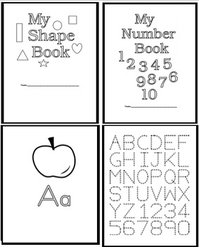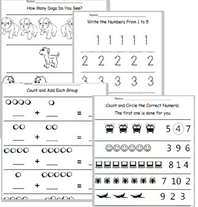Best Strategies for the Top Common Problems in Kindergarten
Kindergarten teachers should be aware of the most common problems in a kindergarten classroom. What are some issues in kindergarten? Those cute little kindergarteners present a unique set of problems. For many, it's their first real school experience. They are just past the toddler stage, and kindergarten teachers will need a variety of ways to solve these problems.
Your kindergarteners will want to move. They cannot sit still for very long. Perhaps even five minutes is too long for a kindergarten teacher to allow them to sit still. Try breaking lessons into short sessions and get them moving. Any movement will do, actually.
They can count snapping their fingers. Learn colors by pointing to objects. Even walking around the room playing follow the teacher. A kindergarten teacher should be very good at incorporating movement and interaction all during the school day. Did you know that experts say this will actually improve concentration? You don't even need to make the movement or activity noisy. It can be quiet. Point to the nose. Shake your right hand. Even wiggle your fingers. By allowing your kindergarteners the chance to move, they will be less likely to have mood swings and be ready to listen.
The potty problem might be the biggest kindergarten one out there. And every teacher who has taught kindergarten knows this already. So, what can you do? Children this age are not used to going it alone. That could be part of the problem. The simple solution to that, is to tell parents to start doing that at home. Let the child go and use the bathroom without help.
That way, they get used to it. You should make your restrooms as private as you can. Some children have trouble with this and try and hold it. That only leads to accidents. The best way to prevent potty problems at school, is to make the child comfortable going at school. Schedule adequate potty breaks, and most important, let children go when needed and watch for the squirm. Good kindergarten teachers know the potty signal. Read: What Makes a Good Kindergarten Teacher?
Eating can also be a problem at kindergarten. If you have a lunch or scheduled snack time, you probably know now that children can have eating problems at school. They don't have time. They play around or talk instead of eating. Opening cartons and packages can be a problem for a kindergartener to do by themselves. Concentrate on motor skills and allow them to experiment with packages and cartons. Make sure the food brought or served is in small pieces that a kindergartener can actually handle. Something like a whole sandwich would be a problem. As always, a good kindergarten teacher watches the students and makes adjustments as needed. Hungry kids at school or after school is not good.
Kindergarteners are germ factories. It might seem like every child in your classroom gets sick many times a year. Well, it is not just your imagination. Many kids in school now have not been around groups of kids for much time. They have not built up an immune system. There's not much you can do except some prevention. Always (teach) use warm water and soap after bathroom and before eating. Hand sanitizer is not perfect, but it's easy and gets most of the job done. We have known kindergarten teachers who spray the desks, chairs, and counters down with things like lysol after school. A good kindergarten teacher will teach hygiene. Don't share cups, combs, food, etc.
The crying game. Kindergarteners have many versions of this. From simple whimpers, to all out major meltdowns. No matter how sweet and kind you think you are, some kids just panic or have bad days. It happens. These kids are under pressure for the first time in their short lives. They have never been awake this long, much less been trapped in a classroom. They miss mommy. They miss home. They don't know better. Will mommy really come back and pick me up? Think like a child and be empathetic. Understand what is going on.
No, that in itself does not make it better, but it gives you information to lean on. Be sure parents know that the child now needs a full night's sleep. That they should be allowed to relax after school. Kind of wind down. Preschool is not the same as kindergarten. Kindergarten taxes a child in new ways. Many parents come to the false conclusion that their child hates school and hates the teacher, when in reality they are just worn out and exhausted. Mention this to your parents. And smile! Veteran kindergarten teachers know that by December or January, the children get much better at this!
Use language that a kindergartener can readily understand. This does not mean dumbing it down. It means your commands and directions should be easily understood by every child in the classroom.
You want to model good behavior, and this includes directions and commands. "Please" is a good word, even for teachers. If you, the teacher, want them to do something, using "I want" can be effective as well. "I want you all to please...." Read: How to get kindergarteners to listen
As a kindergartener you are teaching them a little reading. So, writing some instructions on the board for all to see and say can help. For example, short commands like "clean up," "chairs up," "pencils down," "walk," "eyes up here," are just a few.
Please don't yell. With a room full of noisy kindergarteners, you may feel the need to raise your voice. Don't do it. Instead of yelling, have an attention cue that you use that will always signal that everyone is to be quite and look at you. Holding your finger to your mouth, ringing a bell, are just two examples. Normally counting does not work for children. They will hold out for the last number. What is the last number? A better idea with kindergarteners is to start saying a rhyme or singing a song that all the children know. They will actually eagerly chime in and follow along. End the song, you are ready for the next task. You will actually train them over time, so don't expect it to go perfectly on day one.
Kindergarteners are people too. So, they like to be told or forewarned of what is to come next. So let them know what's coming. Something like, "A few more minutes and clean up is coming." You will need to decide what "time" intervals they comprehend.
Praise them. Always and often. Praise them for good jobs and following directions. Praise them for trying. Kindergarteners do not need to be punished (mostly) in school. They need to be encouraged, nurtured, and loved. They will perform better when they know you like what they are doing.
Common Problems of Kindergarten - Effective ways of dealing with the top problems in a kindergarten classroom.
The Kindergarten Classroom - What makes a good kindergarten teacher?
What to tell parents - Parents of kindergarteners have questions. Do you have the answers?
How to get kindergarteners to listen - Kindergarteners are active and it can be difficult to get them to really pay attention to a teacher.
Making Kindergarteners Future Learners - Kindergarten teachers are the first teachers. After being in your class, will they be ready, willing, and able to learn in future grades?
Nurturing Kindergarten Readers - The basic building blocks of reading are a neccessity for kindergarten. Get them to love reading!
Circle Time Activities - Circle time is a great time to teach, model, interact, socialize, and more!
Numbers, Shapes, and Letters for Kindergarteners

Available on TeachersPayTeachers only $2.99
Kindergarten Math Unit

Available on TeachersPayTeachers only $2.99
More Kindergarten Teaching Strategies at:
Teachersindex.com - Kindergarten Teachers
